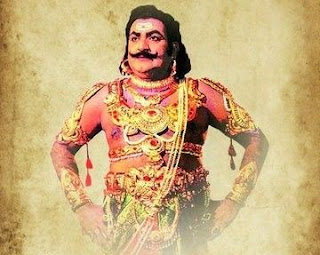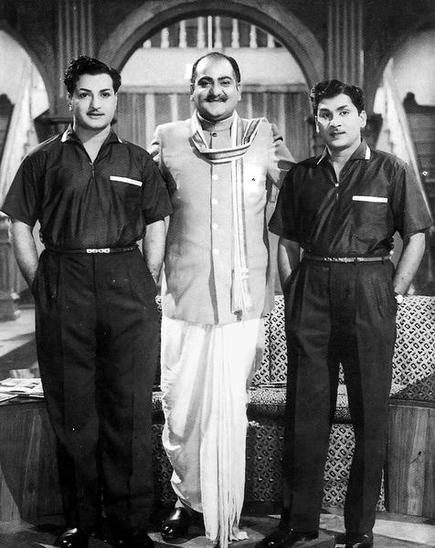S.V. Ranga Rao Biography
ఎస్.వి.
రంగారావు గారి జీవిత చరిత్ర
Samarla Venkata Ranga Rao (3 July 1918 –
18 July 1974), popularly known by his initials SVR, was an Indian actor,
director and producer known for his works in Telugu cinema and Tamil cinema.
Rao was popularly known as "Viswa Nata Chakravarthi". Throughout his film
career, which spanned a total of thirty years, Rao garnered various National
Honors, International Honors, State Nandi Awards, and the Filmfare Special
Award - South.In 1951, Rao appeared in the fantasy film, Pathala Bhairavi,
screened at the first India International Film Festival, held in Mumbai on 24
January 1952. Rao received wide reception for his portrayal of Nepala
Manthrikudu the tantric in the super-hit film.
Rao was known for his natural acting style, portraying complex - social, biographical, and mythological characters such as - Ghatotkacha in Maya Bazaar (1957) which is regarded as the "greatest Indian film of all time" by CNN-India Poll, and was screened at the 1957 International Film Festival of India and the Indonesian Film Festival; Mayasura in Bhookailas (1958); Bhoja in Mahakavi Kalidasu (1960) which won the National Film Award for Best Feature Film in Telugu. In 1964, Rao received the Best Actor Award for his portrayal of Kichaka in Nartanasala (1963) at the Third Afro-Asian Film Festival held in Jakarta, becoming the only Indian actor to have ever garnered the honor.In the same year, he received Filmfare Special Award - South for his performance in Naanum Oru Penn. He then essayed Duryodhana in the blockbuster Pandava Vanavasamu (1965); Hiranyakashipu in Bhakta Prahlada (1967), which won the Nandi Award for Second Best Feature Film; and Ravana in Sampoorna Ramayanamu (1971) to name a few.
Rao has made his foray as a character
actor in super-hits such as Mana Desam (1949), Palletoori Pilla (1950),
Devadasu (1953), Bangaru Papa (1954), Raju Peda (1954), Thodi Kodallu (1957),
Chenchu Lakshmi (1958), Pelli Naati Pramanalu (1958), Nammina Bantu (1959),
Gundamma Katha (1962), Sarada (1962), Annai (1962), Karpagam (1963), Naanum Oru
Penn (1963), Bobbili Yudham (1964), Bandhavyalu (1968), Lakshmi Nivasam (1968),
Prem Nagar (1971), Dasara Bullodu (1971) and Vasantha Maligai (1972). Since he
is considered as the golden standard for acting, the Andhra Pradesh Government
instituted an award in his memory, presented to the best character acting
performance of every year, known as the S.V. Ranga Rao Award for Best Actor.
Early Life
Rao was born in Dowlaiswaram near
Rajahmundry in East Godavari District to a Telugu Speaking family. Samarla
Lakshmi was his mother and Samarla Koteswara Rao, an excise inspector at
Nuzvidu town in Krishna district, Andhra Pradesh, India, was his father. His
mother, Lakshmi Narasayamma, a staunch devotee of Lord Venkateswara, named the
boy after him. Rao was sent to the erstwhile Madras Presidency where he
completed his schooling at Hindu College. At an early age of 12, he showed
interest in stage action, he ventured into acting after completing his
bachelor's degree in sciences.
Cinema
S.V.R. got an invitation from one of his
relatives, B.V. Ramanandam, to play the lead actor in his film Varoodhini. He
immediately abandoned the job, and left for Salem to join the celluloid world.
In fact, it was a great beginning for the young man when the film was released.
However, S.V.R. left the Madras Presidency and reached Jamshedpur, where he
took up the job as a budget assistant with the Tata Company. However, his love
for dramas began to bloom multifold. At this juncture, he married Leelavathi
Badeti on 27 December 1947. In the days that followed, S.V.R. was given an
opportunity to appear in Palletoori Pilla, produced by B. A. Subba Rao. Rao was
offered his first lead antagonist role by Vijaya Pictures.
Personal life and Death
Ranga Rao married Leelavati, daughter of
Badeti Venkata Ramaiah and Koteswaramma on 27 December 1947. They have three
children: two daughters, Vijaya and Prameela and a son, Koteswara Rao. Rao had
a cardiac arrest at Hyderabad in February 1974. He was admitted to Osmania
General Hospital, and then discharged. Another attack on 18 July 1974 at Madras
proved fatal and the actor died before any medical treatment could be
administered.





0 Komentar